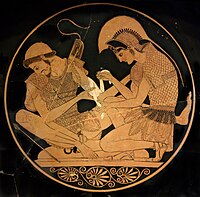Patroclus
Patroclus (Ancient Greek: Πάτροκλος, Pátroklos - "glory of the father") was a central figure in Homer's Iliad. He was the son of Menoetius, and is most famous as being the lover of Achilles.

During the Trojan War, Achilles refuses to fight after a quarrel with Agamemnon, leader of the Greek forces, over a woman, Briseis. Patroclus, with Achilles' permission, then dons Achilles' armor and leads the Myrmidons into battle. The Greeks, thinking him to be Achilles, are roused into a frenzy as they begin to beat the Trojans back. He managed to kill Sarpedon when he charged into battle. However, the ruse is discovered as Patroclus is soon killed by the Trojan prince Hector. The death of Patroclus is a key event in the Iliad, as it serves as the catalyst of Achilles' legendary rage.
Related pages
changeOther websites
change- "The Exact Date of the Deaths of Patroclus and Hector: Was It June 6th-7th, 1218 B.C.?". Stavros Papamarinopoulos. Q-mag.org.